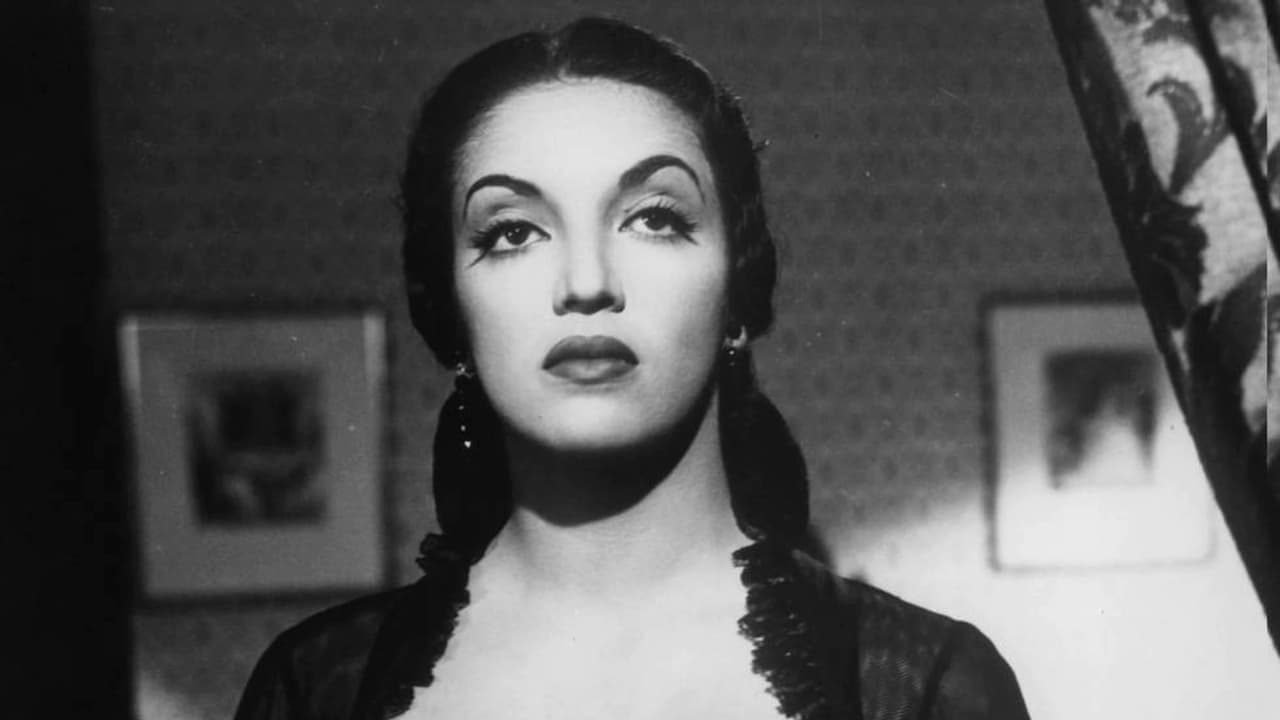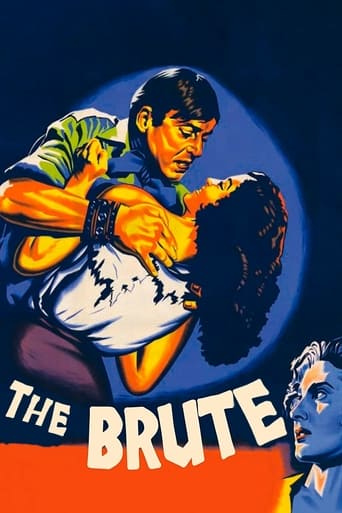

In El Bruto, a violent, ox-like abattoir worker (the great Pedro Armendáriz) is hired by a wealthy and evil old man to do a slum landlord's dirty work . There he proceeds to destroy everyone around him . But the tough, tall and strong Bruto called Pedro will fall in love for a girl called Merche (Rosa Arenas) who lives with her father in the building about to be demolish . Meanwhile , Pedro will work in a butcher's shop , where is also Paloma (Katy Jurado) , Andres (Andres Soler)'s spouse, a mature woman who starts to feel attracted to El Bruto .Buñuel explores his characteristic themes of lust , jealousy , cruelty, class differences , hypocrisy and corruption . This isn't a typical Buñuel film , though there are some symbolism but no surrealism . Interesting and thought-provoking screenplay by the same Luis Buñuel and his usual Mexican collaborator Luis Alcoriza , being efficiently produced by Oscar Danzigers . After his first French period working in which he directed his two greatest surrealist films , he disappeared below the radar in Mexico on a variety of ultra-low-budget films, few of which made much impact outside Spanish-speaking countries , though many of them are well worth watching ; one of them is this ¨Le Brute¨ or ¨El Bruto¨ . Buñuel was given a strict Jesuit education which sowed the seeds of his obsession with both subversive behavior and gritty human dramas , issues well shown in this picture . Pretty good cast gives fine acting ; it is formed by nice Mexican actors such as Pedro Armendariz as El Bruto , a bouncing to kick out a poor people from their houses , Katy Jurado as a satanic Femme Fatale and the innocent and virginal Rosa Arenas .The motion picture was stunningly directed by Luis Buñuel who was voted the 14th Greatest Director of all time . This Buñuel's strange film belongs to his Mexican second period ; in fact , it's plenty of known Mexican actors . As Buñuel subsequently emigrated from Mexico to France where filmed other excellent movies . After moving to Paris , at the beginning Buñuel did a variety of film-related odd jobs , including working as an assistant to director Jean Epstein . With financial help from his mother and creative assistance from Dalí, he made his first film , this 17-minute "Un Chien Andalou" (1929), and immediately catapulted himself into film history thanks to its disturbing images and surrealist plot . The following year , sponsored by wealthy art patrons, he made his first picture , the scabrous witty and violent "Age of Gold" (1930), which mercilessly attacked the church and the middle classes, themes that would preoccupy Buñuel for the rest of his career . After his two avant-garde collaborations with fellow surrealist Salvador Dali , his career, though, seemed almost over by the mid-1930s, as he found work increasingly hard to come by and after the Spanish Civil War , where he made ¨Las Hurdes¨ , as Luis emigrated to the US where he worked for the Museum of Modern Art and as a film dubber for Warner Bros . He subsequently went on his Mexican period he teamed up with producer Óscar Dancigers and after a couple of unmemorable efforts shot back to international attention , reappearing at Cannes with ¨Los Olvidados¨ in 1951 , a lacerating study of Mexican street urchins , winning him the Best Director award at the Cannes Film Festival. But despite this new-found acclaim, Buñuel spent much of the next decade working on a variety of ultra-low-budget films, few of which made much impact outside Spanish-speaking countries , though many of them are well worth seeking out . As he went on filming "The Great Madcap" , ¨The brute¨, "Wuthering Heights", ¨El¨ , ¨Susana¨ , "The Criminal Life of Archibaldo De la Cruz" , ¨Robinson Crusoe¨ , ¨Death in the garden¨ and many others . His mostly little-known Mexican films , rough-hewn , low-budget melodramas for the most part , are always thought-provoking and interesting ; being ordinary screenwriter Julio Alejandro and Luis Alcoriza . He continued working there until re-establishing himself in Europe in the 1960s as one of the great directors . And finally his French-Spanish period in collaboration with producer Serge Silberman and writer Jean-Claude Carrière with notorious as well as polemic films such as ¨Viridiana¨ was prohibited on the grounds of blasphemy , ¨Tristana¨ , ¨The Discreet Charm of the Bourgeoisie" , of course , ¨ ¨Belle Du Jour¨ , with all the kinky French sex and his last picture , "That Obscure Object of Desire" .
... View MoreAlthough this is definitely a minor Bunuel – being pretty much a straightforward melodrama, with little of the expected subtext – it is still well-made and acted and undeniably entertaining; as opposed to most of his Mexican work, there have been two R1 DVD releases of the film from Cozumel (the first to be released and the one I immediately purchased) and, more recently, Facets. THE BRUTE also provided the director with a rare chance to work with popular Mexican actors who, like EL (1953)'s Arturo De Cordova soon after, already had established reputations in Hollywood – though it is safe to assume that Pedro Armendariz would never again be so rugged nor Katy Jurado so earthy as in their sole film for Luis Bunuel! As I said, the plot is simple: wealthy but ageing businessman Andres Soler wants to sell a property currently leased to numerous poor families; he presents them with an eviction notice but, through the instigation of a few headstrong tenants, they unanimously refuse to vacate the premises and almost assault their landlord for what they consider his inhumanity and greediness! Arriving home with his pride broken, he does not elicit sympathy from his much younger and determined wife (an altogether startling turn by Jurado, who walked off with a Silver Ariel award for Best Supporting Actress!) but she instantly suggests, metaphorically, that he simply get rid of the opposition and, to this end, Soler hires a brawny but slow-witted slaughterhouse worker nicknamed "Bruto" (Armendariz).The latter's first attempt at intimidation, even if he had even hardly touched the man, results in tragedy (due to the victim's weak physical condition); for this reason, Soler shelters him in his own house, where the boss' hilariously doddering and cantankerous, yet mischievous, father (played by 81-year old Paco Martinez) also resides; the elderly man's shtick – his uniquely doddering walk on the way to procure himself some candy behind his son's back, his constant muttering of the would-be swear word "Pugnales" and even licking tequila off of his daughter-in-law's little finger – is a source of much amusement throughout the film. Bruto's defection to the Soler household liberates him from the oppression in his own home which he shares with his live-in girlfriend and her family of 'leeches': a bed-ridden, perennially expiring but chain-smoking would-be-mother-in-law; her own lame brother who badmouths her at every turn; her ingrate and unemployed son who only visits to fleece the relief money, etc.! Before long, Jurado turns her attentions to Bruto – who is unable to resist her; in fact, the sexual tension the film displays in their clandestine encounters must have been an eye-opener for its time (certainly when compared with the Hollywoodian standard).Further plot complications arise when the residents try to teach Armendariz a lesson and, injured by a nail driven through his shoulder(!), he stumbles into the hovel where the daughter (called Meche, just like the milk-bathing girl in Bunuel's LOS OLVIDADOS [1950]) of his own earlier victim has been living; she unselfishly looks after him, and he finds himself falling for the girl (a young Rosita Arenas, later star of such classic Mexi-Horror titles as THE WITCH'S CURSE [1960] and THE CURSE OF THE CRYING WOMAN [1961]). This turn-of-events – which anticipates Marlon Brando's fate in Elia Kazan's Oscar-laden classic ON THE WATERFRONT (1954) – obviously jeopardizes Bruto's relationship with Jurado and, after she confronts the younger woman and Armendariz gives the boss' wife a piece of his mind in the only way he knows how, the rejected mistress informs her clueless husband that Bruto had raped her!All of which leads first to a tete-a'-tete between the landlord and his thug, which leaves the former with a broken back and his face smashed in (again, it was unusual to depict violence in such an unflinching manner back then) and, eventually, Bruto's own demise in a hail of bullets when he is cornered by the Police (led to him by Jurado herself); curiously enough, there are some who hold the view that THE BRUTE is Bunuel's retelling of the Frankenstein tale in a modernized socio-political key but, frankly, it did not strike me that way – after all, the creator did not intend his creature to do his evil bidding! Anyhow, Arenas had grown fond of Armendariz in spite of herself and she lies by his side as he expires but, tellingly, the film's last shot sticks with his other jilted lover – Jurado now left all alone and probably gone off her rocker Tennessee Williams-style as she glares defiantly at a rooster believing it is making fun of her!
... View MoreHad Luis Bunuel ever made a bad movie? I've seen fourteen his films and every one of them is great, simply fantastic, starting with the most famous short film, 17 minutes long "Un chien andalou" (1929) and ending with his swan song, "That obscure object of desire" (1977). Bunuel made films in France, his native Spain, and in Mexico where he had to immigrate after Franco came to power in Spain. Each of his films is uniquely brilliant but all of them have in common his magic touch no matter what period of his life they belong."El Bruto" is no exception and it is a strong combination of a surreal melodrama and political film which could also be viewed as a modern retelling of the Frankenstein's story. Pedro "El Bruto" is a young tough slaughterhouse laborer who is exploited by a tyrannical landowner who may be his father and to whom he is very loyal. He is eager to help Don Andres to evict the poor tenants form their houses that belong to Don Andres. Pedro is a simple man who was not used to think a lot and analyze the motivations of the others but he will learn and his eyes will open. Pedro will become a not so obscure object of desire of two women, passionate and strong-willed Paloma, the young wife of Don Andres and the kind and gentle Meche, whose father Pedro accidentally kills while doing the job for Don Andres. As is supposed to be in the melodrama, one of the women is scorned and hell hath no fury as she does and the inevitable ending is coming. The very last shot of the movie with its enigmatic irony is pure Bunuel - only he would finish the film the way he did.
... View MoreThis was the first film I've seen of Luis Bunuel and this movie stars Pedro Armendariz as a strong guy with a lot of muscle but not a lot of brains. He his hired by a landlord to do anything to get the tenants to move out and he winds up killing an old man who was their leader. Katy Jurado is the landlord's wife and they have an affair. Pedro is chased by some of the men with weapons and hides out in the apartment of the girl who's father he killed but she doesn't know that. There isn't much else to the plot but there are several murders at the end but you can find out for yourself who is murdered. Pedro has worked with John Ford before and Katy Jurado was in High Noon and One Eyed Jacks.
... View More